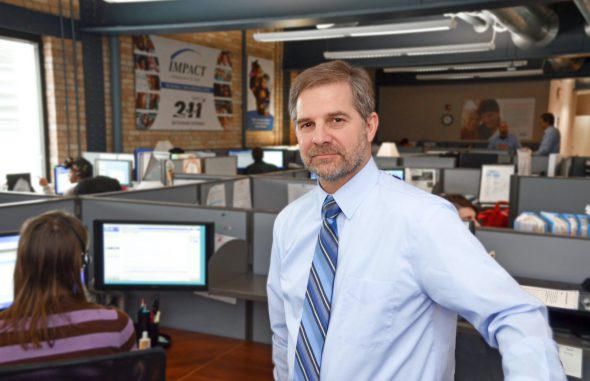2-1-1 Operators Handle COVID-19 Crisis Calls
IMPACT, the nonprofit that administers 211 phone line, saw daily calls triple after pandemic arose.

Yolanda Coleman, a community resource specialist at IMPACT 2-1-1, says her nonprofit exists to serve residents. “Our role is to help them and do our best to get them some stability.” Photo courtesy of Yolanda Coleman/NNS.
Yolanda Coleman’s phone rings nonstop, and it’s seldom because of good news.
“I get calls from elderly people who are crying because they are hungry and can’t leave their house, people suffering from stress, fear and depression, and from people who have never been in a position where they needed help,” said Coleman, who answers calls to the 24-hour 2-1-1 crisis contact center.
Although they now work from home due to COVID-19, IMPACT 2-1-1 community resource specialists like Coleman are part of an unsung group of essential workers on the front lines of the pandemic.
IMPACT 2-1-1 is the area’s central access point for people in need. Users can get free and confidential services by calling the 2-1-1 helpline, texting their ZIP code to TXT-211, chatting online in real time with specialists or by searching a database on their own.
These days, Coleman said callers seek information about food, mental health and substance abuse services, information on COVID-19 testing and everything in between.
“We try to problem-solve with them and coach them to be an advocate for themselves,” she said. “Our role is to help them and do our best to get them some stability.”
John Hyatt, president and CEO of IMPACT, the nonprofit that administers 2-1-1, said calls to the center tripled from 500 to 1,500 a day during the initial stages of the pandemic in March. With news broadcasts flashing 2-1-1 across the bottom of the screen as a number to call for help, the center quickly became a focal point for individuals concerned about how to stay safe from the coronavirus, what to do about their bills and even where to find toilet paper, he said.
Though the call volume at the center, which serves the entire southeastern Wisconsin region, has slowed slightly since then, Hyatt said the need in the community is still great.
“COVID-19 has had a particularly negative impact on the community’s most vulnerable populations,” Hyatt said.
In addition, another COVID-19-related challenge for 2-1-1 operators is that services they typically connected callers with have changed or been discontinued.

“COVID-19 has had a particularly negative impact on the community’s most vulnerable populations,” says John Hyatt, president and CEO of IMPACT, the nonprofit that administers 2-1-1. Photo courtesy of IMPACT/NNS.
“Some pantries increased their boundary limits or increased the amount of food a client can take at a time, others have created special resources in response to the pandemic, while other organizations are temporarily shut down,” said Kayla Kasprzak, a resource department manager who just marked her five-month anniversary at IMPACT 2-1-1.
Since March 13, resource specialists have updated IMPACT’s database with over 800 programs or services compared with about 150 they normally process during that span, she said.
Recognizing that IMPACT 2-1-1 needed support to meet the increased demand, Bader Philanthropies awarded the organization a $100,000 grant, which is being used to hire three additional staff members.
Daniel J. Bader, president and CEO of Bader Philanthropies, said it was important to his organization’s board of directors to support organizations such as IMPACT 211.
“These nonprofits have shown bravery and stepped up to the plate to address the needs of the community, even while the situation was evolving,” Bader said. In total, Bader provided $1 million in grants to IMPACT and other organizations as part of its local COVID-19 emergency relief effort.
The increase in staff will provide much needed help for the call center, Hyatt said, as operators prepare for a possible uptick in calls as more jobs and resources dry up.
Coleman will be one of the workers waiting to help.
“I will encourage you to not give up and will tell you I love you if that’s what I think you need to hear,” she said. “Give us a chance to help.”
This story was originally published by Milwaukee Neighborhood News Service, where you can find other stories reporting on fifteen city neighborhoods in Milwaukee.
More about the Coronavirus Pandemic
- Governors Tony Evers, JB Pritzker, Tim Walz, and Gretchen Whitmer Issue a Joint Statement Concerning Reports that Donald Trump Gave Russian Dictator Putin American COVID-19 Supplies - Gov. Tony Evers - Oct 11th, 2024
- MHD Release: Milwaukee Health Department Launches COVID-19 Wastewater Testing Dashboard - City of Milwaukee Health Department - Jan 23rd, 2024
- Milwaukee County Announces New Policies Related to COVID-19 Pandemic - County Executive David Crowley - May 9th, 2023
- DHS Details End of Emergency COVID-19 Response - Wisconsin Department of Health Services - Apr 26th, 2023
- Milwaukee Health Department Announces Upcoming Changes to COVID-19 Services - City of Milwaukee Health Department - Mar 17th, 2023
- Fitzgerald Applauds Passage of COVID-19 Origin Act - U.S. Rep. Scott Fitzgerald - Mar 10th, 2023
- DHS Expands Free COVID-19 Testing Program - Wisconsin Department of Health Services - Feb 10th, 2023
- MKE County: COVID-19 Hospitalizations Rising - Graham Kilmer - Jan 16th, 2023
- Not Enough Getting Bivalent Booster Shots, State Health Officials Warn - Gaby Vinick - Dec 26th, 2022
- Nearly All Wisconsinites Age 6 Months and Older Now Eligible for Updated COVID-19 Vaccine - Wisconsin Department of Health Services - Dec 15th, 2022
Read more about Coronavirus Pandemic here




















